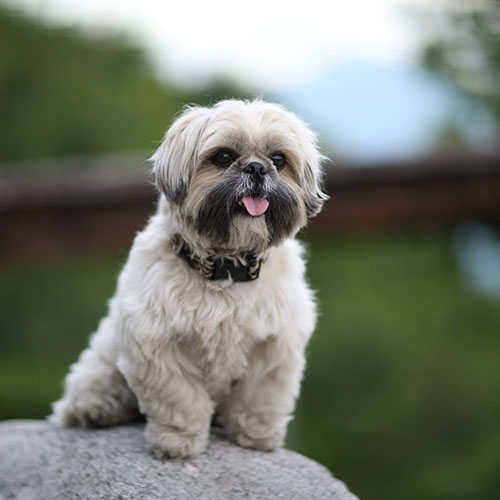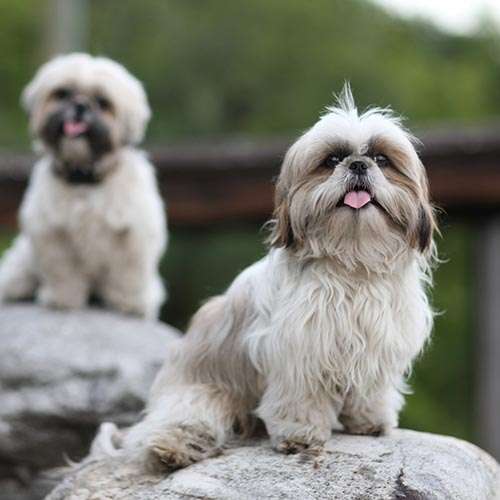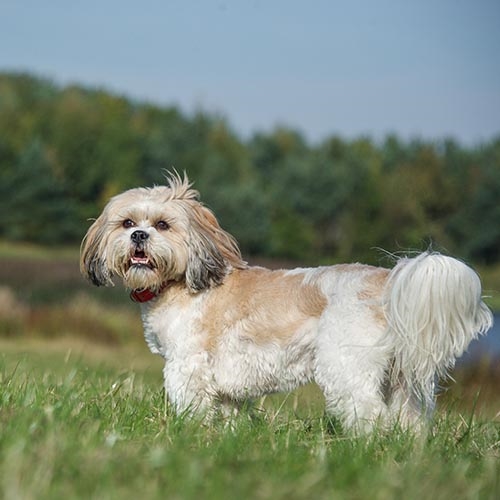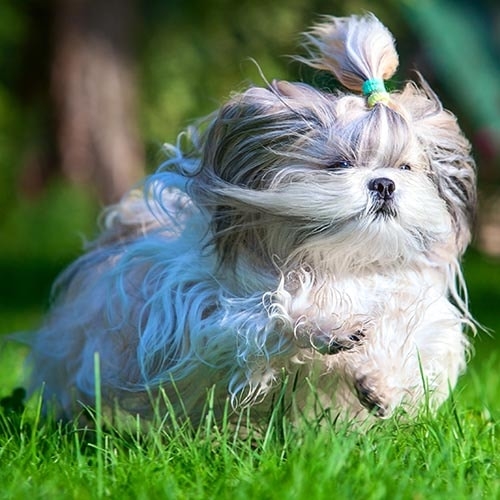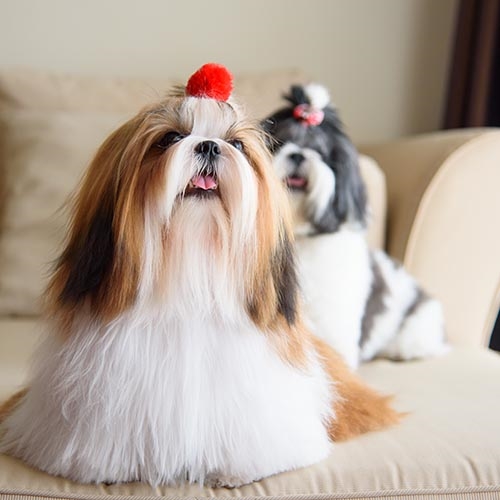| Size | Small |
|---|---|
| Average height | 27 cm |
| Average weight | 4.5-7.5 kg |
| Average lifespan | Over 10 years |
| Minimum exercise (per day) | 1 hour |
| Coat length | Long |
| Minimum cost (per month) | £50 |
Shih Tzus were originally bred in Tibet to be companion dogs but were also used as watchdogs to announce the arrival of visitors.
Even today, Shih Tzu’s can make great little companion dogs and it’s still in their nature for them to want to be involved in everything their owner does!
Common health problems in Shih Tzus
Shih Tzus are bred to be loyal and loving companions and make great family pets in the right household. However, as with many purebred dogs, they can be more likely to develop certain health conditions.
If you are thinking of buying a Shih Tzu puppy, make sure the parents of your puppy have had the relevant health screening to reduce the chances of your puppy being affected by certain conditions. We’d recommend looking for a Kennel Club Assured Breeder as they meet extra requirements which will benefit your puppy’s health.
Some of the conditions Shih Tzus may develop include:
- Eye problems including:
- Dry eye (Keratoconjunctivitis sicca/ KCS) – when one or both eyes don’t produce a normal amount, or type, of tears. This leads to the eye becoming very dry, causing infections and ulcers.
- Cataracts – a ‘clouding’ of the lens of the eye affecting vision – breeding dogs should be screened every year.
- Progressive retinal atrophy – gradual loss of sight over several months or years.
- Retinal detachment – this is when the retina, a light sensitive layer of the eye, becomes loose and separates from its usual position at the back of the eyeball. This can lead to blindness.
- Brachycephalic obstructive airway syndrome (BOAS) – this can cause severe breathing problems and is caused by their shorter faces.
- Rostral bite problems – crowding and displaced teeth, due to a lack of space in the mouth.
- Renal Dysplasia – an inherited condition where parts of the kidney (the nephrons and glomeruli) don't develop properly from birth, resulting in failure at a young age
- Intervertebral disc disease – abnormality of the discs that provide cushioning between the vertebrae (back bones).
- Cushing's disease (Hyperadrenocorticism) – hormonal disorder which results in the production of too much cortisol.
- Umbilical Hernia – a protruding swelling at the site of the naval or ‘belly button’ caused by a weakness or opening in the abdominal muscle leftover from where the umbilical cord was once attached. In mild cases fatty tissue can push through this weak spot, but in rarer concerning cases, intestines or even organs can protrude.
Take a look at our advice on how to choose a healthier pedigree.
Caring for your Shih Tzu
Shih Tzus are bright little dogs who should be confident and bold, despite their small size! They’ll need regular grooming because of their long fur (which grows upwards on their face!).
They don’t need a lot of space, which makes Shih Tzus perfect for a variety of households, whether you’re in a flat or house in the countryside. As long as there’s enough space for your Shih Tzu to play in, they’ll be happy.
Shih Tzus and barking
As with any dog, your Shih Tzu is likely to make some noise and this will be down to the individual dog, their personality and training. This said, as Shih Tzus were bred to alert their owners to visitors, this natural instinct is likely to be expressed! It’s important to recognise the causes behind any problem barking and make changes quickly, before it becomes a habit. If you’re having trouble with problem barking, we’d recommend seeking the advice of an accredited behaviourist.
Training and socialisation
Shih Tzus are alert, lively little dogs and eager to learn, so do really well with positive, reward-based training which should be started from a young age. Because of their small size and the fact they usually take well to training, Shih Tzus are an ideal pet for first-time owners. Remember to be consistent with their training and if you need some help, take your dog along to accredited training classes.
Shih Tzus are usually sociable dogs who love company. Socialising your Shih Tzu with a variety of people and experiences from a young age will help them to develop into happy, confident adults.
As with any dog, your Shih Tzu shouldn’t be left alone for more than four hours a day.
Exercise
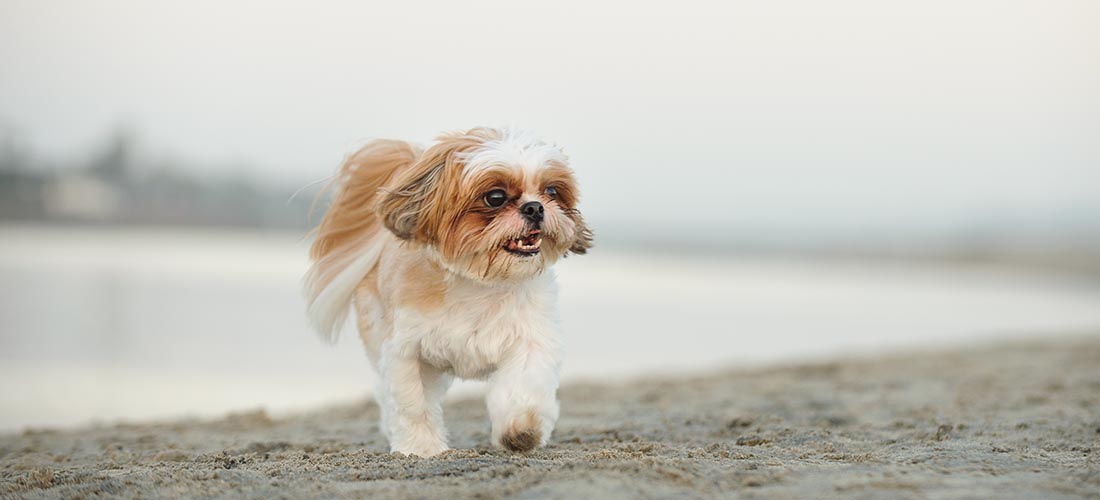
They might be small, but Shih Tzus are still energetic! They like to get involved in whatever you’re doing and will be more than happy to potter around after you all day if given the chance.
Your Shih Tzu will need an hour exercise every day to stay fit and healthy. This should be split into a couple of short walks with lots of time to sniff, explore and play off-lead in a secure area. On top of this, your Shih Tzu will enjoy plenty of playtime with you and short training sessions to keep their keen minds active.
Puzzle toys and games are perfect for Shih Tzus as they give them a chance to keep their minds sharp.
Grooming
Shih Tzus are known for their lovely long fur, which is very beautiful but also really high maintenance! They’ll need a daily brush to keep their coat knot-free as they have what is known as a ‘double coat’. Unless you’re showing your Shih Tzu, most owners opt to keep their fur clipped. This will need doing every 6-8 weeks, usually by a professional groomer.
Keep a close eye on the fur around you Shih Tzu’s mouth and nose, trimming it occasionally and keeping the area clean as food can collect around there and make the skin sore, which could potentially lead to infections. Due to their head shape and quite large eyes, you may notice gunk collects by the corner of their eye. This will need gently wiping away to keep them clean and prevent coat staining.
Despite their long fur, Shih Tzus are pretty average shedders. Expect them to shed more in autumn and spring, but otherwise a daily brush and quick go around with a vacuum should be plenty.
Shih Tzus and children
All dogs are different and behaviour can vary widely within a breed. However, Shih Tzus can be good-natured family pets if they’ve been given the right socialisation and training so they know what’s expected of them. It’s really important that children are taught how to behave around dogs, so that both your dog and your children can enjoy a long and happy relationship.
You should always supervise your Shih Tzu with children. Make sure you can understand your dog’s body language, so you can put a stop to any potentially stressful situations before they escalate.
Find out more on keeping children safe around dogs in our free guide.
Shih Tzus and other pets
Shih Tzus can be really sociable dogs, so as long as they have had lots of positive experiences with other dogs from a young age they should get along with them fine.
Due to their sociable nature, Shih Tzus can get along with other pets they have grown up with, but this certainly doesn’t mean they won’t chase another pet if the mood takes them! Always supervise your dog with other pets.
Food
Your Shih Tzu’s diet will vary depending on their age and any health conditions they may have. You’ll need to feed them a complete, balanced dog food to keep them slim and healthy.
Your vet will be able to tell you how much your dog should be eating. You should feed a healthy Shih Tzu a good quality, commercially available and complete dog food and it’s usually recommended to split their daily allowance into two meals. If you give your dog an occasional treat or use treats for training, remember to take this into account and reduce their daily allowance. Treats shouldn’t make up more than 10% of their calories or they can unbalance their diet.
You should try to feed your dog at the same time every day to get them into a routine. Remember to leave a gap after eating and before exercising.
The cost of owning a Shih Tzu
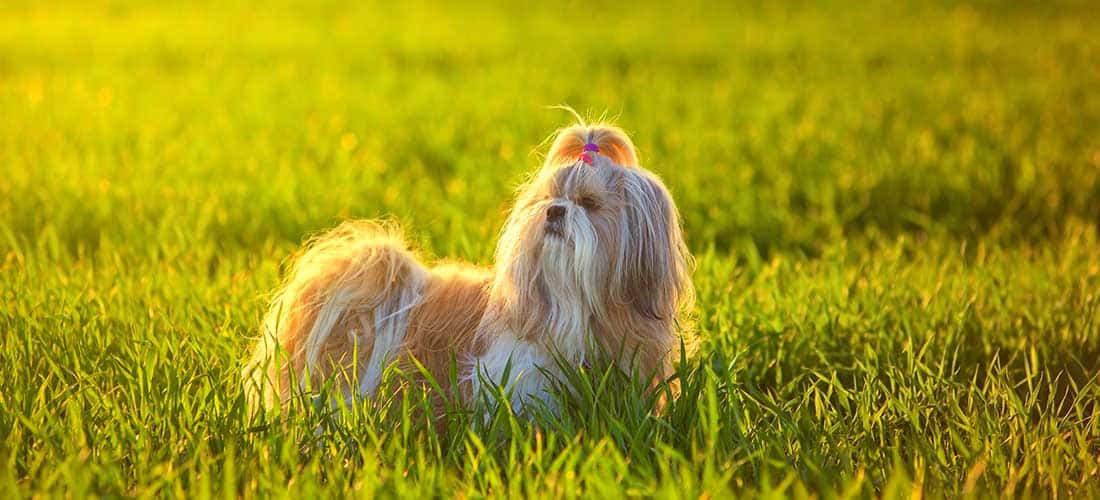
Having a Shih Tzu will cost a minimum of £50 per month after purchase and set-up costs and up to £8,900 across their lifetime.
Costs you’ll need to think about include:
Purchase costs
Adopting an adult dog from a rescue centre may be a more cost-effective option, as well as having the added advantage of offering a home to a pet without one – check if the rehoming centre you’re looking at asks for a donation for rehoming.
If instead you’re buying a Shih Tzu puppy from a breeder, you’ll need to factor in this cost. Beware unusually cheap puppies as they could come from a puppy farm. If you want to buy a pedigree puppy, we recommend looking for a Kennel Club Assured breeder as they have to do extra health tests and meet higher standards.
Set-up costs
- Puppy vaccines – if you rescue a dog, reputable centres will often vaccinate them for you. Remember that ongoing booster vaccinations will be needed to continue their immunity.
- Neutering – you should usually arrange for your dog to be neutered at around six months old, though your vet will be able to advise you exactly when is best. Check prices at your local practice as these will depend on your vet and where you live. Some rescue centres will neuter any dogs they rehome, saving you this cost.
- Equipment – including a collar and tags, lead, harness, dog beds, dog bowls, pet-safe toothpaste and toothbrushes, grooming brushes and toys. Keep in mind that all these will need to be replaced with wear or damage or if your dog outgrows or damages them!
Ongoing costs
- Food.
- Preventive healthcare – budget for routine vet visits to help stop your dog getting ill and catch any problems early. They need annual check-ups, vaccinations and regular flea and worming treatments. Check if your vet offers a health care plan as this can help spread the cost throughout the year.
- Vet bills* or pet insurance – if you don’t have pet insurance and your dog needs veterinary treatment for an injury or illness, costs can rapidly mount up. Check what’s covered and what isn’t when comparing policies.
- Accessories – including lots of poo bags, replacing worn toys and grooming accessories, buying doggy toothpaste and any other extras they might need.
Other costs
- Training – basic training is very important and dogs can benefit from formal classes. Some dogs may have, or develop, behavioural problems which might need professional management.
- Boarding – you may also need to budget for boarding or dog sitting costs if you are planning to go away from home on holiday.
- Dog walkers/day-care – you might consider a professional dog walker to keep your dog happy and healthy if you’re unable to get out with your dog enough yourself, or to look after them during the day if you need to be out for more than four hours.
* It’s always better to plan ahead and budget or get pet insurance in case your pet gets injured or unwell. If you are having difficulty with veterinary costs, you can check if you are eligible for treatment at PDSA here.
If you’re considering pet insurance, our PDSA Pet Insurance could be a great option for you and it’s quick and easy to get a quote online.
Fun facts
- Their name comes from a Mandarin phrase meaning ‘Lion dog’.
- The breed is over 1,000 years old and strangely enough, Shih Tzus are more closely related to wolves than some larger breeds.
- All Shih Tzus today can be traced back to the same 14 dogs as the breed nearly went extinct in the 1930s and only a few remained.
- The fur on their noses grows upward, which is why they need regular trimming (and why you sometimes see Shih Tzus with little top knots).
Getting a Shih Tzu
Shih Tzus are loving, people-orientated dogs who thrive off company. While they do need a good amount of exercise considering their small size, they are happy living in a flat or a large country home as long as they have space to play which makes them popular pets. If you have the time to give to your Shih Tzu, they could be the ideal pet for you.
Rehoming centres
There are plenty of rescue centres across the country where you may find a Shih Tzu. Breed-specific rescues that specialise in Shih Tzus are out there too. You’ll need to ask any rescue centre about the dog’s history to make sure they will be comfortable in your home. Good rescue centres should let you know of any health and behaviour problems.
Breeders
If you buy a Shih Tzu puppy from a breeder, make sure your puppy will be well socialised and have all necessary health checks and vaccinations. We recommend looking for a Kennel Club Assured breeder as they meet higher standards. We’ve put together some advice to help you find a good breeder.


